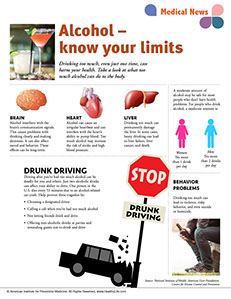SYMPTOM CHECKER
CONDITIONS
Male
Female
Child
Arm, Hand & Shoulder Concerns
Legs & Feet Concerns
Dental & Mouth Concerns
Ear & Nose
Eye Conditions
Head Conditions
Arm, Hand & Shoulder Concerns
Legs & Feet Concerns
Front
Back
Arm, Hand & Shoulder Concerns
Dental & Mouth Concerns
Ear & Nose
Eye Conditions
Head Conditions
Arm, Hand & Shoulder Concerns
Dental & Mouth Concerns
Ear & Nose
Eye Conditions
Head Conditions
Front
Back
Arm, Hand & Shoulder Concerns
Neck Links
Head & Neck Concerns
Arm, Hand & Shoulder Concerns
Neck Links
Head & Neck Concerns
Front
Back
Online Clinic
Wise Healthcare
Alcohol – know your limits

Print on Demand
Drinking too much, even just one time, can harm your health. Take a look at what too much alcohol can do to the body.
Brain: Alcohol interferes with the brain’s communication signals. This causes problems with thinking clearly and making decisions. It can also affect mood and behavior. These effects can be long-term.
Heart: Alcohol can cause an irregular heartbeat and can interfere with the heart’s ability to pump blood. Too much alcohol may increase the risk of stroke and high blood pressure.
Liver: Drinking too much can permanently damage the liver. In some cases, heavy drinking can lead to liver failure, liver cancer, and death.
A moderate amount of alcohol may be safe for most people who don’t have health problems. For people who drink alcohol, a moderate amount is:
• Women: No more than 1 drink per day
• Men: No more than 2 drinks per day
Drunk driving
Driving after you’ve had too much alcohol can be deadly for you and others. Just two alcoholic drinks can affect your ability to drive. One person in the U.S. dies every 53 minutes due to an alcohol-related car crash. Help prevent these tragedies by:
• Choosing a designated driver
• Calling a cab when you’ve had too much alcohol
• Not letting friends drink and drive
• Offering non-alcoholic drinks at parties and reminding guests not to drink and drive
Behavior Problems
Drinking too much can lead to violence, risky behavior, and even suicide or homicide.
Sources: National Institutes of Health, American Liver Foundation, Centers for Disease Control and Prevention
This website is not meant to substitute for expert medical advice or treatment. Follow your doctor’s or health care provider’s advice if it differs from what is given in this guide.
The American Institute for Preventive Medicine (AIPM) is not responsible for the availability or content of external sites, nor does AIPM endorse them. Also, it is the responsibility of the user to examine the copyright and licensing restrictions of external pages and to secure all necessary permission.
The content on this website is proprietary. You may not modify, copy, reproduce, republish, upload, post, transmit, or distribute, in any manner, the material on the website without the written permission of AIPM.
2021 © American Institute for Preventive Medicine - All Rights Reserved. Disclaimer | www.HealthyLife.com















































